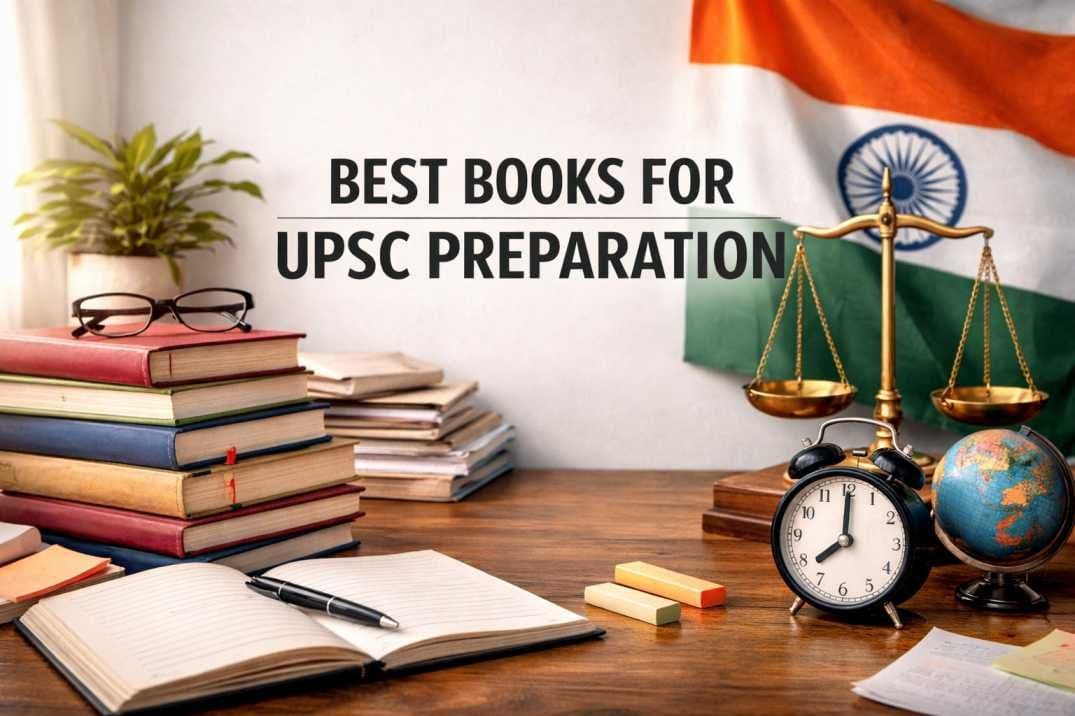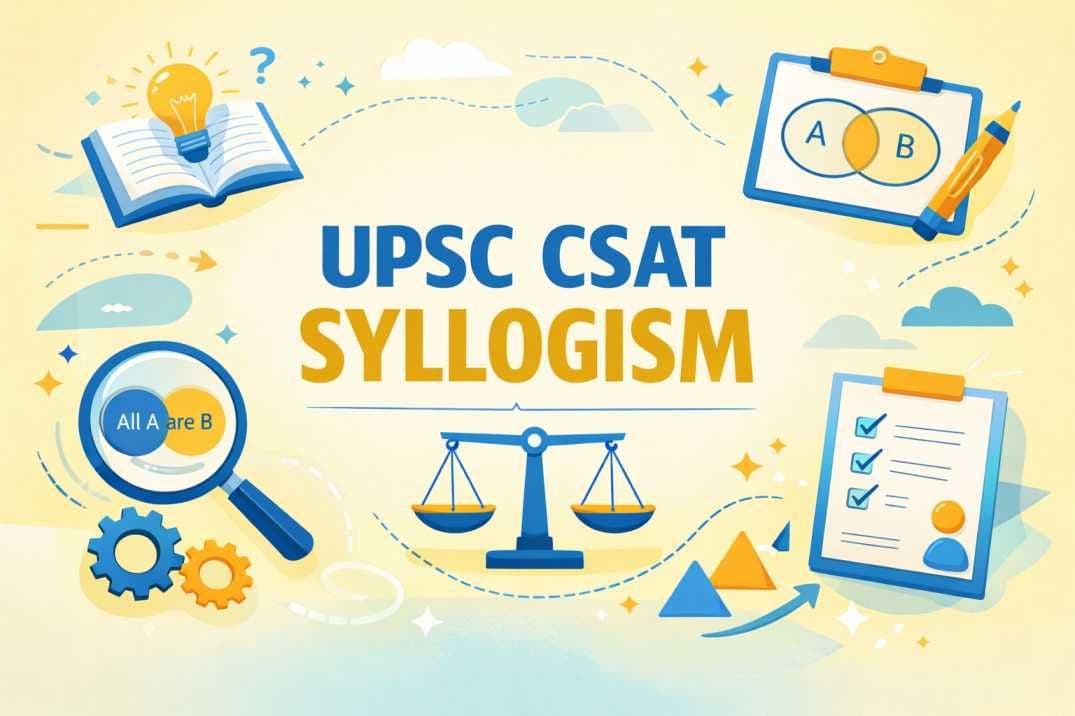Preparing for Polity in UPSC Exams: Strategy and Tips
Mar, 2025
•7 min read
Polity forms a solid 15-20% of the questions in UPSC Prelims and is a significant player in the Mains General Studies Paper II. Polity holds a huge chunk of marks that can make or break your final rank! Thousands of aspirants grapple with the best approach to tackle this critical subject every year.
To master Polity, you need more than just memorizing facts; you need smart strategies, focused resources, and a roadmap that ensures you cover every important topic. In this blog, we'll break down effective study techniques, key topics you can’t afford to miss, and tips to retain information long-term. Ready to ace Polity like a pro? Let’s dive in!
Why Polity is Crucial for the UPSC Exam?

Polity is not just another subject to check off your study list; it’s the backbone of the entire exam and your future role in governance. Here’s why Polity plays such a critical role in your preparation:
- Key Player in Both Prelims and Mains
- Foundation of the Indian Administrative System
- Significance in Governance
- Helps to understand current political issues and policies
- Essential for Understanding Indian Society
- Crucial for Essay Writing
- Build background for the Interview Stage
- Interlinked with Other Subjects
- Prepares for Handling Real-World Administrative Challenges
- Foundation for Ethics and Integrity
- Critical for Decision-Making and Problem-Solving
- Improves Analytical Skills
Understanding the Polity Syllabus for Prelims and Mains
Now that we’ve explored why Polity is crucial for the UPSC exam, let’s dive into the specifics of what you need to study. The UPSC syllabus for Polity is vast but structured. Here’s a breakdown of the Polity syllabus for the Prelims and Mains examination.
Preliminary Examination
In the Prelims, Polity forms a significant portion of the General Studies Paper I. The questions are objective and test your basic understanding of the Constitution, governance, and political systems. Here’s a breakdown of the Polity syllabus for Prelims:
|
Topics |
|
Indian Constitution: Evolution, Preamble, Features, Key Amendments, Articles, Schedules |
|
Fundamental Rights, Directive Principles, Fundamental Duties |
|
States and Union Territories |
|
Union, State, and Local governments |
|
Citizenship |
|
Policies, Reforms, and Government schemes |
|
Parliament |
|
Executive and Legislature |
|
Judiciary |
|
Judicial Principles: Public Interest Litigation, Judicial Review, and Constitutional Remedies |
|
Constitutional Bodies |
|
Non-Constitutional Bodies |
Mains Examination
Polity plays an even more prominent role in the Mains, particularly in GS Paper II, which covers governance, the Constitution, and issues related to the political system. The questions here are more analytical, requiring you to connect your knowledge to real-world scenarios. Check out the detailed Polity syllabus for UPSC Mains GS Paper II:
|
Topics |
Details |
|
Indian Constitution |
|
|
Governance & Polity |
|
|
Social Justice |
|
Core Topics to Focus on
- Indian Constitution: Preamble, Fundamental Rights, Duties, Directive Principles
- Union and State Governments: Structure and functions of President, Parliament, and Judiciary
- Local Governance: Panchayati Raj and Urban Local Bodies
- Constitutional Amendments: Key amendments and significant judgments
Master COMPLETE Fundamental Rights in 1 Video| UPSC Prelims| Indian Polity | SuperKalam
List of Resources for Preparing Polity for UPSC

Having understood the detailed syllabus for Polity in both Prelims and Mains, the next step is gathering the right resources to build a strong foundation. The subject requires both conceptual clarity and analytical skills, so it's essential to refer to reliable and comprehensive study materials. Here’s a list of top resources to help you master Polity for the UPSC exam.
|
Category |
Resources |
|
Polity NCERT Textbooks |
|
|
Governance NCERT Textbooks |
|
|
Standard Books for Polity |
|
|
Current Affairs Resources |
|
Also watch: Complete GS Syllabus Revision with LIVE UNLIMITED TESTS.
Best Strategy to Prepare Polity for the UPSC Examination
A balanced strategy combining foundational knowledge with application-oriented learning will prepare you for Prelims and Mains. Here’s a practical approach to mastering the Polity syllabus for the UPSC:
Analyze the Syllabus Thoroughly
- Break down the polity syllabus into major topics. This approach allows you to systematically tackle each topic without feeling overwhelmed.
- Pro Tip: Create a visual syllabus map with these categories to track your progress.
To structure your subject-wise study plan effectively, read How Many Hours Per Day Required To Study For UPSC IAS Exam?
Cover Syllabus from Reliable Sources
- Use NCERT books for foundational understanding and to deepen your knowledge of political concepts.
- Standard books like M. Laxmikanth’s Indian Polity provide a comprehensive overview of Indian Polity and Governance structure.
- You can annotate important points in these books for a quick review later or use sticky notes to bookmark essential information.
Dive into the ultimate guide and explore the list of NCERT Books Required for UPSC Exam Preparation. Get started now with expert-recommended books!
Read the Bare Constitution

- For clarity on articles and provisions, refer to the Bare Act of the Indian Constitution.
- Reading the Constitution's actual text helps you understand its exact wording, which is reflected in UPSC questions.
- Pay special attention to fundamental rights and the Directive Principles; they frequently appear in both Prelims and Mains.
Stay Updated on Current Affairs
- Stay informed about constitutional amendments, landmark Supreme Court judgments, and debates on governance issues. Reliable sources like PRS India and LiveLaw provide timely updates.
- Follow developments on topics such as the right to privacy, freedom of speech, and recent judicial interpretations of fundamental rights.
- Pro Tip: Keep a separate notebook for landmark judgments and amendments, noting the governance and citizen rights implications.
Analyze Key Government Policies and Schemes
- Study significant policies and schemes (e.g., Digital India, Swachh Bharat Mission, Ayushman Bharat). Government schemes often have implications for governance and social justice.
- For schemes like the Swachh Bharat Mission, understand the objectives, funding, and implementation challenges.
- Pro Tip: Create mind maps for each policy, listing objectives, pros, cons, and challenges. This helps you remember specifics and analyze policies holistically.
Make Use of Mnemonics for Retention
- Mnemonics are powerful tools for remembering lists and sequences, especially when dealing with articles, amendments, or committee recommendations.
- Create acronyms for the seven fundamental rights or the DPSPs to recall them quickly.
- Pro Tip: Develop personalized mnemonics for complex lists. For example: To remember the Schedules of the Indian Constitution, use the Mnemonic: TEARS OF OLD PM

Also watch: 1 Mind-Map A Day Series | UPSC CSE
Practice with Previous Year Questions (PYQs)
- Review at least 8–10 years of Previous Year Questions. This helps you understand question trends and the type of analytical questions often asked.
- Pay attention to recurring themes like constitutional bodies, separation of powers, and federalism.
- Pro Tip: Organize PYQs by topics within Polity and revise these regularly. Focus on questions that combine current affairs with static concepts.
Answer Writing Practice

- Work on writing answers that are balanced, structured, and analytical. Include both theoretical perspectives and recent developments in your answers.
- Each answer should follow the format of an Introduction, Body, and Conclusion. Practice presenting your analysis in concise, clear points using facts or statistics.
Want to start answer writing? Check out our guide on How to begin daily writing practice for UPSC Mains answers.
Engage in Mock Tests and Peer Discussions
- Practice mock tests regularly to test your knowledge and timing. Engaging in discussions with peers also helps in sharing diverse perspectives.
- Pro Tip: Join online study groups or forums to discuss recent Supreme Court judgments or policy changes. This will help you view issues from multiple angles.
Following this detailed strategy, which focuses on foundational knowledge, current developments, and answer structuring, you’ll be confidently prepared to tackle Polity in the UPSC exam.
Also watch: How to Deal with Indian Polity for UPSC Prelims & Mains: Ideal way to study Polity | UPSC CSE.
Challenges While Preparing Polity for UPSC
“It’s not the will to succeed that matters; it’s the will to prepare to succeed.”
Many UPSC aspirants find Polity challenging due to its vast syllabus, complex concepts, and ever-evolving current affairs. But with the right approach and strategies, you can turn these challenges into stepping stones toward success. Let’s dive into some common challenges and actionable solutions that can make studying Polity manageable and enjoyable.
|
Challenge |
Solution |
Example |
|
Complex language of constitutional Articles. |
Create a syllabus checklist and work through each section one by one. |
Article 21: Right to life and personal liberty. Familiarize yourself with the real-world application of such articles. |
|
Time-consuming nature of reading bare acts. |
Focus on high-yield articles and provisions relevant to the UPSC syllabus. |
Prioritize sections on Fundamental Rights (Articles 12–35) and Directive Principles (Articles 36–51), which are frequently tested. |
|
Confusion in interpreting landmark judgments and case laws |
Summarize each landmark case in simple terms, focusing on the core judgment. |
For Kesavananda Bharati vs. State of Kerala—the Basic Structure Doctrine—briefly note the key points. |
|
Issue in balancing static and current aspects of Polity |
Dedicate a notebook specifically to current updates and align them with static topics. |
For a topic like the Right to Information (RTI), read about its constitutional basis in Article 19, then update it with recent changes in the RTI Act. |
|
Difficulty in retention and revision of vast content |
Schedule regular revision sessions and use spaced repetition techniques. Mind maps and summary charts for each chapter can aid in quick recall. |
Create a mind map of Fundamental Rights and place it somewhere visible to reinforce your memory every time you review it. |
With these strategies, you can tackle Polity with confidence. Remember, every challenge presents an opportunity to learn more effectively.
Also read: Essential Strategy to Crack UPSC IAS Exam in First Attempt
Conclusion
A systematic, strategic approach is essential for preparing UPSC Polity, and following this roadmap will set you up for success. Remember, dedication and consistent practice are your allies in this journey. Stick to your goals, stay motivated, and make your Polity for UPSC preparation as robust as possible.
Keep going; you’re on the path to mastering this essential subject!
Ready to turbocharge your UPSC prep? Check out SuperKalam and experience the magic of a personalized AI-powered Super Mentor! Immerse yourself in a dynamic learning environment where you can practice MCQs on any topic around the clock.
Also watch: DIRECT Questions in Prelims 2024 from SuperKalam's Mindmaps and Tests | With PROOF!


